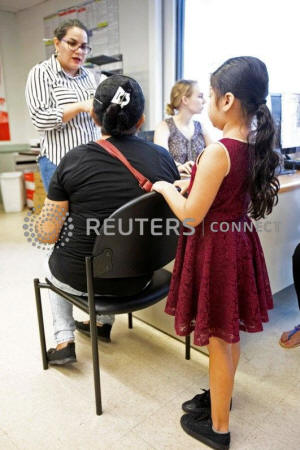Trump rule targeting poor immigrants could harm children, health:
advocates
 Send a link to a friend
Send a link to a friend
 [August 16, 2019]
By Daniel Trotta [August 16, 2019]
By Daniel Trotta
NEW YORK (Reuters) - A Trump administration
plan to cut legal immigration by poor people will likely result in
sicker children, more communicable diseases and greater homelessness in
the United States, according to immigrant advocates and the federal
government's own analysis.
Under a rule unveiled this week, the administration can reject
applicants for temporary or permanent visas if they fail to meet high
enough income standards or if they receive public assistance such as
welfare, food stamps, public housing or Medicaid.
Legal immigrants are already refusing services they are legally entitled
to, whether from government sources or private charities, out of concern
they would harm their chances of remaining in the country, according to
professionals who provide food, health and housing services.
"This will result in millions of kids losing access to healthcare,
housing and nutrition," said Kristen Torres, director of child welfare
and immigration for First Focus on Children, a bipartisan group that
advocates for pro-child policies before the federal government.
President Donald Trump has made curbing legal and illegal immigration a
cornerstone of his presidency, and presented the rule as an effort to
prevent people from becoming "public charges" dependent on government
support.

The federal government estimates the status of 382,000 immigrants could
immediately be reviewed when the new rule takes effect Oct. 15.
Immigrant advocates fear the real number could be much higher, with the
policy reducing legal immigration by as much as half.
In a notice published in the Federal Register last year, the Department
of Homeland Security acknowledged that the consequences of the policy
could include increased obesity and malnutrition, especially for
pregnant or breastfeeding women, infants, or children; increased
prevalence of communicable diseases, and increased poverty.
"The real tragedy of this that young kids are going to be really
penalized," said Lisa David, chief executive of Public Health Solutions,
a non-profit organization funded mostly by New York City that provides
social services such as enrolling women and children in food programs
and health insurance.
In Houston, the Episcopal Church outreach center ECHOS noticed a sharp
drop in the number of immigrants seeking out its services after Trump
took office in January 2017, a trend that continued with subsequent
anti-immigration initiatives, executive director Cathy Moore said.
[to top of second column]
|

Staff workers Marcela Parra and Allena Perry work with clients
seeking assistance for Hurricane Harvey at the ECHOS center in
Houston, Texas, U.S., on August 15, 2019. REUTERS/Daniel Kramer

The number of people served by ECHOS who took part in the federal
food stamp program fell by 21 percent this year, the group said.
But at the same time it saw a 67-percent surge in the number of
people visiting its food pantry, which the group said was a sign
that immigrants were forgoing government food aid in favor of the
less risky food pantry.
The data is based on 3,509 households served in the first seven
months of 2018 and 4,145 in the same period of 2019, most of them
Latino and immigrant families, Moore said.
When families eschew the Supplemental Nutrition Assistance Program,
commonly known as food stamps, the result is hungry kids and
malnourished pregnant women, both of which could lead to lead to
long-term developmental problems, experts say.
When a proposal of the public charge rule was made public last
September, New York's private Public Health Solutions observed a 20
percent drop in SNAP clients.
"People that don't have food security have more illness, they have
poorer outcomes, and children certainly don't perform in school,"
said David, the group's CEO.
The group has regularly seen immigrants shy from seeking its
services in response to White House efforts to crack down on
immigration, she said.
For instance, the group's clinic in New York's immigrant-rich Corona
neighborhood typically sees 15 to 20 patients on a typical Saturday.
On July 13, when Trump announced nationwide immigration raids would
be begin, none showed up, David said.

(Reporting by Daniel Trotta; Editing by Scott Malone and Alistair
Bell)
[© 2019 Thomson Reuters. All rights
reserved.]
Copyright 2019 Reuters. All rights reserved. This material may not be published,
broadcast, rewritten or redistributed.
Thompson Reuters is solely responsible for this content. |